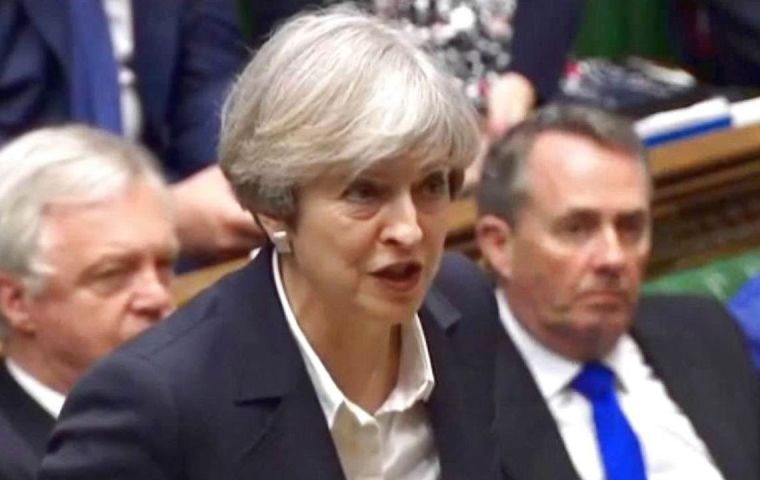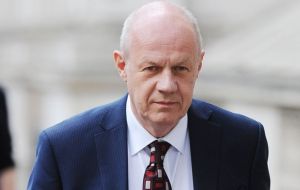MercoPress. South Atlantic News Agency
PM May calls for unity as Commons begins to debate the Brexit repeal bill
 The prime minister said the withdrawal bill was “the single most important step we can take to prevent a cliff-edge for people and businesses”.
The prime minister said the withdrawal bill was “the single most important step we can take to prevent a cliff-edge for people and businesses”.  PM May said the bill delivered the result of last year's EU referendum, adding that “now it is time for Parliament to play its part”.
PM May said the bill delivered the result of last year's EU referendum, adding that “now it is time for Parliament to play its part”.  In an article in the Sunday Telegraph, the prime minister's de facto deputy Mr. Green said that “no Conservative wants a bad Brexit deal”
In an article in the Sunday Telegraph, the prime minister's de facto deputy Mr. Green said that “no Conservative wants a bad Brexit deal”  Former minister and Remainder Anna Soubry told the Observer the repeal bill “amounts to a trouncing of democracy and people will not accept it”.
Former minister and Remainder Anna Soubry told the Observer the repeal bill “amounts to a trouncing of democracy and people will not accept it”.  Scottish and Welsh governments have also raised concerns about the repeal bill, with Welsh First Minister Carwyn Jones describing it as a “naked power grab”.
Scottish and Welsh governments have also raised concerns about the repeal bill, with Welsh First Minister Carwyn Jones describing it as a “naked power grab”. Theresa May has appealed for unity from pro-EU Conservative MPs as the Commons is set to debate the government's Brexit repeal bill on Thursday. The bill, seen as a key plank of the government's Brexit policy, transfers EU law into UK legislation
Mrs. May has said there will be proper scrutiny, but some MPs fear it will give ministers sweeping new powers. First Secretary of State Damian Green said a Tory rebellion would increase “the threat of a Corbyn government”.
The prime minister said the legislation, known officially as the European Union (Withdrawal) Bill, was “the single most important step we can take to prevent a cliff-edge for people and businesses”.
She said the bill delivered the result of last year's EU referendum, adding that “now it is time for Parliament to play its part”.
Mrs. May added: “We have made time for proper parliamentary scrutiny of Brexit legislation and welcome the contributions of MPs from across the house.”
In an article in the Sunday Telegraph, the prime minister's de facto deputy Mr. Green said that “no Conservative wants a bad Brexit deal”, and a potential rebellion threatened to strengthen Labor's position.
But former minister and Remainer Anna Soubry told the Observer the repeal bill “amounts to a trouncing of democracy and people will not accept it”.
She added that it was “outrageous” to suggest pro-EU Tories supported Jeremy Corbyn. The legislation is not supported by the Labour Party, which has requested changes in six areas, including guarantees that workers' rights will be protected.
Shadow Brexit secretary Sir Keir Starmer said Labour would not support the bill unless “significant changes were made”.
But in The Sun on Sunday, Brexit Secretary David Davis said the opposition's “only motivation is the pursuit of chaos”.
The Scottish and Welsh governments have also raised concerns about the repeal bill, with Welsh First Minister Carwyn Jones describing it as a “naked power grab”.
Separately, Downing Street has rejected reports the prime minister is preparing to approve a £50bn financial settlement with the EU after the Conservative Party conference in October.
According to the Sunday Times, a close ally of Mrs. May said her negotiating position with Brussels had been weakened because of June's election result, in which the Conservatives lost the Commons majority they had won in 2015.
A spokesperson for No 10 said the claims were “not true”.
Britain's divorce bill with the EU has been frustrating talks with negotiators in Brussels. During the third set of talks between the UK and the EU, Europe's chief negotiator Michel Barnier said Mr Davis needed to “start negotiating seriously”.
The repeal bill
• Formally known as the European Union (Withdrawal) Bill, the draft legislation is a key plank of the government's Brexit strategy
• The first line of the bill says the European Communities Act 1972, which took Britain into the EU, will be “repealed on exit day”
• This will end the supremacy of EU law and stop the flow of new regulations from Brussels
• But all existing laws derived from the EU will continue to be in force - they can be changed or scrapped by further legislation
• The bill does not detail policies line-by-line but transfers all regulations into domestic law
• It gives the UK two years after Brexit to correct any “deficiencies” arising from the transfer




Top Comments
Disclaimer & comment rules-

Read all commentsThe bill needs to be quashed, or rewritten, and May needs to be replaced as PM. She isn't interested in leaving the EU, but taking it with her. Incorporating all EU laws and regulations into British law is unacceptable, and she's already made so many concessions in principle in the negotiation that Britain will never escape EU control. If Britain is to actually leave the EU, a PM who wants to leave must do it, not May, who is more loyal to the EU than to the UK.
Sep 04th, 2017 - 09:27 pm 0Commenting for this story is now closed.
If you have a Facebook account, become a fan and comment on our Facebook Page!